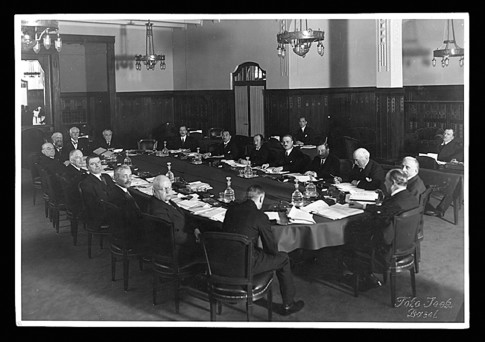– Meet The Secretive Group That Runs The World (ZeroHedge, April 11, 2015):
Over the centuries there have been many stories, some based on loose facts, others based on hearsay, conjecture, speculation and outright lies, about groups of people who “control the world.” Some of these are partially accurate, others are wildly hyperbolic, but when it comes to the historic record, nothing comes closer to the stereotypical, secretive group determining the fate of over 7 billion people, than the Bank of International Settlements, which hides in such plain sight, that few have ever paid much attention.
This is their story.
First unofficial meeting of the BIS Board of Directors in Basel, April 1930
* * *
The following is an excerpt from TOWER OF BASEL: The Shadowy History of the Secret Bank that Runs the World by Adam LeBor. Reprinted with permission from PublicAffairs.
The world’s most exclusive club has eighteen members. They gather every other month on a Sunday evening at 7 p.m. in conference room E in a circular tower block whose tinted windows overlook the central Basel railway station. Their discussion lasts for one hour, perhaps an hour and a half. Some of those present bring a colleague with them, but the aides rarely speak during this most confidential of conclaves. The meeting closes, the aides leave, and those remaining retire for dinner in the dining room on the eighteenth floor, rightly confident that the food and the wine will be superb. The meal, which continues until 11 p.m. or midnight, is where the real work is done. The protocol and hospitality, honed for more than eight decades, are faultless. Anything said at the dining table, it is understood, is not to be repeated elsewhere.


